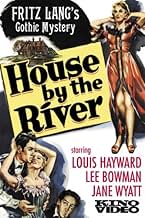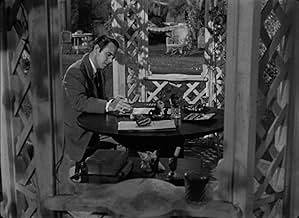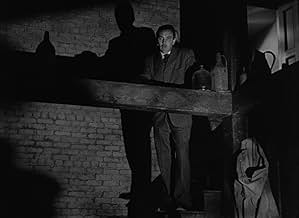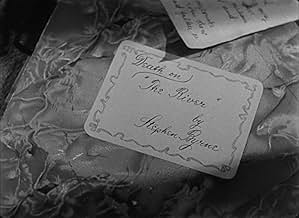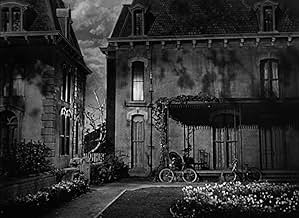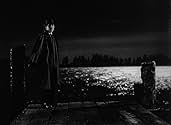NOTE IMDb
7,0/10
4,6 k
MA NOTE
Un écrivain fou assassine une femme de ménage après qu'elle ait résisté à ses avances. Il fait appel à son frère pour cacher le corps, puis observe la scène alors que son frère devient le su... Tout lireUn écrivain fou assassine une femme de ménage après qu'elle ait résisté à ses avances. Il fait appel à son frère pour cacher le corps, puis observe la scène alors que son frère devient le suspect principal du meurtre.Un écrivain fou assassine une femme de ménage après qu'elle ait résisté à ses avances. Il fait appel à son frère pour cacher le corps, puis observe la scène alors que son frère devient le suspect principal du meurtre.
- Réalisation
- Scénario
- Casting principal
Bob Burns
- Courtroom Spectator
- (non crédité)
Edgar Caldwell
- Square Dancer
- (non crédité)
Edward Clark
- Minor Role
- (non crédité)
Frank Dae
- Col. Davis
- (non crédité)
Avis à la une
For some reason, the great director chose to degrade this film on some occasions, yet at other times he would revel in details of the film's opening quarter-hour. However, at the time that he made this film, he was despondent over the collapse of his Diana Productions which was a co-venture with Joan Bennett and her husband Walter Wanger. With no offers in sight from the majors, Lang chose to visit "Poverty Row" which may have left him with bad memories of a film of which he should have been more pleased.
In HOUSE BY THE RIVER, we have Lang working at the bargain basement Republic Pictures, where Orson Welles had just made a similar descent to make MACBETH. In each case, the decline was only in budget, not in quality. In Lang's case, we have a film that plays as a great companion piece to his SECRET BEHIND THE DOOR, both being a change of pace Gothic thriller from the master of spies and noir.
Incidentally, the promise of artistic freedom offered at Republic did stop when Lang attempted to cast a black actress as the maid. We're just lucky that Vera Hruba Ralston (wife of company head Yates) wasn't cast as the wife.
The screenwriter, Mel Dinelli, working from the A.P. Herbert novel, was a past and future hand at these "house" mellers - he previously did the screenplay for THE SPIRAL STAIRCASE and would do BEWARE, MY LOVELY in 1952. He segued well from Robert Siodmak to Fritz Lang as long-time Langian themes such as conscience and fate are in evidence here. Oddly, it is not the lead who suffers a conscience. Hayward's Stephen Byrne, a hack writer who has been lusting for the new maid played by Dorothy Patrick, revels in his self-promoted celebrity now that she's "disappeared." She's actually been accidentally murdered by Stephen, who had been filled with lustful thoughts as the maid bathed and seems to have a near orgasm as he hears the bathwater go down the drain outside the house - the look on Hayward's face is priceless.
It's his brother John who aided him in hiding the body (and who is referred to as having gotten his brother out of other scrapes) who turns to drink to quell his conscience and who is the primary suspect in the inquest. Little does he know that his brother is subtly implicating him in the crime in toto. His fate would be that no good deed (siblingly speaking) goes unpunished. The brother is played by Lee Bowman, and it's the only role of his in which I can say he's memorable. That's not to say that otherwise he's a forgettable player, just that he's not distinguishable from a bunch of mustachioed players who came out while the head ranks were off to war and who quickly had to retreat once they returned.
Hayward is so enjoying his celebrity that he's signing books by day and wife Jane Wyatt refers to him being out all night and smelling of cheap perfume when he comes home. She's beginning to realize that Lee Bowman's John Byrne is the better of the brothers, although the story implies that she was his own unrequited love.
But as unsympathetic as Stephen Byrne may be, before an audience ever rooted for Robert Walker trying to retrieve his lighter in STRANGERS ON A TRAIN, we share Stephen's fears of the body doing some synchronized swimming with the deer. While attempting to retrieve it, he only makes it worse for himself by accidentally (he can't do much right it seems) opening the top of the sack and letting out some flowing blond hair to make it even more obvious. When Stephen later finds that his brother's monogram is on the sack, he breaks into a devilish smile of contentment.
Cinematographer Edward Cronjager works well with Lang on their second pairing (the previous one was the gorgeous Technicolor WESTERN UNION). When the body (in a sack) starts popping up in the river, we recall the image of a floating deceased deer from earlier in the film and a character's claim that it shows up at about the same time every day given the tide.
If the ending seems rushed, it's only a reflection of the lead character's madness (a quick snap), unlike the state of mind of Chris Cross (Edward G. Robinson) at the ending of SCARLET STREET which is more detailed. It could have been a bit tidier, but maybe the head man cut the budget and schedule short. It was known to happen at Republic.
In HOUSE BY THE RIVER, we have Lang working at the bargain basement Republic Pictures, where Orson Welles had just made a similar descent to make MACBETH. In each case, the decline was only in budget, not in quality. In Lang's case, we have a film that plays as a great companion piece to his SECRET BEHIND THE DOOR, both being a change of pace Gothic thriller from the master of spies and noir.
Incidentally, the promise of artistic freedom offered at Republic did stop when Lang attempted to cast a black actress as the maid. We're just lucky that Vera Hruba Ralston (wife of company head Yates) wasn't cast as the wife.
The screenwriter, Mel Dinelli, working from the A.P. Herbert novel, was a past and future hand at these "house" mellers - he previously did the screenplay for THE SPIRAL STAIRCASE and would do BEWARE, MY LOVELY in 1952. He segued well from Robert Siodmak to Fritz Lang as long-time Langian themes such as conscience and fate are in evidence here. Oddly, it is not the lead who suffers a conscience. Hayward's Stephen Byrne, a hack writer who has been lusting for the new maid played by Dorothy Patrick, revels in his self-promoted celebrity now that she's "disappeared." She's actually been accidentally murdered by Stephen, who had been filled with lustful thoughts as the maid bathed and seems to have a near orgasm as he hears the bathwater go down the drain outside the house - the look on Hayward's face is priceless.
It's his brother John who aided him in hiding the body (and who is referred to as having gotten his brother out of other scrapes) who turns to drink to quell his conscience and who is the primary suspect in the inquest. Little does he know that his brother is subtly implicating him in the crime in toto. His fate would be that no good deed (siblingly speaking) goes unpunished. The brother is played by Lee Bowman, and it's the only role of his in which I can say he's memorable. That's not to say that otherwise he's a forgettable player, just that he's not distinguishable from a bunch of mustachioed players who came out while the head ranks were off to war and who quickly had to retreat once they returned.
Hayward is so enjoying his celebrity that he's signing books by day and wife Jane Wyatt refers to him being out all night and smelling of cheap perfume when he comes home. She's beginning to realize that Lee Bowman's John Byrne is the better of the brothers, although the story implies that she was his own unrequited love.
But as unsympathetic as Stephen Byrne may be, before an audience ever rooted for Robert Walker trying to retrieve his lighter in STRANGERS ON A TRAIN, we share Stephen's fears of the body doing some synchronized swimming with the deer. While attempting to retrieve it, he only makes it worse for himself by accidentally (he can't do much right it seems) opening the top of the sack and letting out some flowing blond hair to make it even more obvious. When Stephen later finds that his brother's monogram is on the sack, he breaks into a devilish smile of contentment.
Cinematographer Edward Cronjager works well with Lang on their second pairing (the previous one was the gorgeous Technicolor WESTERN UNION). When the body (in a sack) starts popping up in the river, we recall the image of a floating deceased deer from earlier in the film and a character's claim that it shows up at about the same time every day given the tide.
If the ending seems rushed, it's only a reflection of the lead character's madness (a quick snap), unlike the state of mind of Chris Cross (Edward G. Robinson) at the ending of SCARLET STREET which is more detailed. It could have been a bit tidier, but maybe the head man cut the budget and schedule short. It was known to happen at Republic.
The most interesting aspect of House By The River is the fact that it was produced at Republic Pictures, the home of Roy Rogers and several other B movie cowboys and the values those pictures put forth. Hardly the place for a moody and atmospheric thriller that examines a man's moral degeneracy directed by Fritz Lang who always likes to explore the dark. One thing that does mark this as a Republic film is the usual Herbert J. Yates economy.
But for a director like Lang who was used to exploring shadowy worlds, economy on the set isn't a hindrance, though back in Germany this man directed the opulent Metropolis. House By The River delivers the most for its meager budget.
Louis Hayward who was a poor man's Tyrone Power and like Power could play straight heroes and hero/heels gets his Nightmare Alley type role as the rich and idle writer who just can't move the writer's block. He takes a real fancy to maid Dorothy Patrick and when she repulses his advances, Hayward kills her. He gets older and club footed brother Lee Bowman to dump the body in the river. But as dead bodies will do, they bloat and have a nasty habit of floating to the top.
Lang and Hayward create a really frightening picture of moral degeneracy that would have resonated well with post World War II audiences who had just defeated a nation gripped in the philosophy that it was a race of super people. Jane Wyatt gets her innings in playing Hayward's wife who Bowman also loved and who starts thinking that maybe she married the wrong brother.
I have to single out Jody Gilbert from the cast who plays Bowman's housekeeper and who Bowman takes his frustrations out on after he's helped Hayward. She's not the sharpest knife in the drawer and misreads all of Bowman's signals and later does him damage at a coroner's inquest.
I'm not sure how much money House By The River brought in to Republic Pictures, but it is a minor masterpiece for this studio.
But for a director like Lang who was used to exploring shadowy worlds, economy on the set isn't a hindrance, though back in Germany this man directed the opulent Metropolis. House By The River delivers the most for its meager budget.
Louis Hayward who was a poor man's Tyrone Power and like Power could play straight heroes and hero/heels gets his Nightmare Alley type role as the rich and idle writer who just can't move the writer's block. He takes a real fancy to maid Dorothy Patrick and when she repulses his advances, Hayward kills her. He gets older and club footed brother Lee Bowman to dump the body in the river. But as dead bodies will do, they bloat and have a nasty habit of floating to the top.
Lang and Hayward create a really frightening picture of moral degeneracy that would have resonated well with post World War II audiences who had just defeated a nation gripped in the philosophy that it was a race of super people. Jane Wyatt gets her innings in playing Hayward's wife who Bowman also loved and who starts thinking that maybe she married the wrong brother.
I have to single out Jody Gilbert from the cast who plays Bowman's housekeeper and who Bowman takes his frustrations out on after he's helped Hayward. She's not the sharpest knife in the drawer and misreads all of Bowman's signals and later does him damage at a coroner's inquest.
I'm not sure how much money House By The River brought in to Republic Pictures, but it is a minor masterpiece for this studio.
Intense period thriller about a writer, Stephen Byrne (played by Louis Hayward), who lives in - yeah, you guessed it - a house by the river; with lovely yard and gazebo, yet oddly dark as the film opens with the sky clouded, shadows cast across scenery, haunting music, a dead animal floating by on the glistening water, and a black widow spider crawling over his writing. We meet the attractive, blonde servant girl, Emily, who Stephen clearly has a lustful eye on from the get-go. By the next scene, he tries to kiss her coming down the stairs after bathing in his tub, and, well, she screams and he "accidentally" strangles her. With his brother assisting him, they put her body in a big sack and sink her in the river, then follows the cover-up of the murder.
Well, this film is quite interesting, dark and suspenseful - there's a lot going on here. The print I saw looked strikingly full of sharp black and white contrast. The photography in this makes the film menacing with blackened rooms lit only by candle light casting dark, sharp shadows across the walls, some extreme camera angles up stairs and down halls, shots of faces seen only in mirrors, extreme close-ups, and sweat dripping on the face of a nervous murderer.
Well, this film is quite interesting, dark and suspenseful - there's a lot going on here. The print I saw looked strikingly full of sharp black and white contrast. The photography in this makes the film menacing with blackened rooms lit only by candle light casting dark, sharp shadows across the walls, some extreme camera angles up stairs and down halls, shots of faces seen only in mirrors, extreme close-ups, and sweat dripping on the face of a nervous murderer.
House by the River is something of an anomaly; it's more of an old-dark-house Gothic than the grittier dramas, from Fury to Beyond A Reasonable Doubt, which Fritz Lang made in his American period. (The location of this house is a worrisome and amateurism anomaly, too; the conventions, milieu and some of the accents suggests that it's an English country estate, but much else argues that the film takes place in the U.S.) Would-be writer Louis Hayward, getting flirtatious with the maid in the absence of his wife (Jane Wyatt), accidently strangles her when she resists his advances. His brother (Lee Bowman) reluctantly agrees to cover up for him and help sink the body in the sinister, ever-present river that runs by the edge of the property; the resulting scandal of the disappeared servant bolsters the writer's flagging career. When suspicion begans to gather around his innocent brother, Hayward, by now seriously demented, couldn't be more pleased. But then Wyatt comes across a hidden manuscript; Hayward (you see), flushed by his phoney success, resolves to write "what he knows...."
Edward Cronjager's heavily shaded cinematography and Georges Anthiel's brooding score help fill out Lang's dark, clammy vision, making the river -- forever disgorging its flotsam and jetsam -- a principal character in the action. House by the River is a good old-fashioned thriller, particularly in its Gothic closing scenes, but it's not in a class with Lang's films at the top of his American form, like Scarlet Street, The Big Heat or Human Desire.
Edward Cronjager's heavily shaded cinematography and Georges Anthiel's brooding score help fill out Lang's dark, clammy vision, making the river -- forever disgorging its flotsam and jetsam -- a principal character in the action. House by the River is a good old-fashioned thriller, particularly in its Gothic closing scenes, but it's not in a class with Lang's films at the top of his American form, like Scarlet Street, The Big Heat or Human Desire.
Failing novelist Stephen Byrne (Louis Hayward) murders his maid and manipulates his brother John (Lee Bowman) into helping him dispose of the body. Later, after it has been found, he sees a chance to pin the crime on John, whom he eventually tries to kill, too (making it look like suicide). 'House by the River' is suffering from one essential downside: The plot is illogical. While Stephen does everything to let suspicion fall on his brother, he is at the same time working on a new novel (following the advice of a neighbour to focus on things he knows) about a murder - a novel that is as good as an admission of guilt. And if he puts all this into that novel, which after all he intends to publish, why is he so desparate to prevent his wife Marjory (Jane Wyatt) from reading the manuscript? Despite all this, I am rating 'House by the River' 7 stars. That is because it is well-acted and beautifully photographed. Especially the eerie scenes on the river (with its murky and brackish water) are great. In sum, this is by no means one of Fritz Lang's best films, far from it. But it has some important points in its favour.
Le saviez-vous
- AnecdotesFritz Lang originally wanted a black woman to play the role of Emily Gaunt, but the producers refused.
- GaffesThe women are dressed in turn of the century type clothing but the men are wearing modern hats and suits.
- Citations
John Byrne: You must be very, very ill Stephen...
Stephen Byrne: Ill?
- Bandes originalesTurkey in the Straw
(uncredited)
American folk song
Author unknown
Meilleurs choix
Connectez-vous pour évaluer et suivre la liste de favoris afin de recevoir des recommandations personnalisées
- How long is House by the River?Alimenté par Alexa
Détails
- Date de sortie
- Pays d’origine
- Langue
- Aussi connu sous le nom de
- House by the River
- Lieux de tournage
- Société de production
- Voir plus de crédits d'entreprise sur IMDbPro
- Durée1 heure 23 minutes
- Couleur
- Rapport de forme
- 1.33 : 1
Contribuer à cette page
Suggérer une modification ou ajouter du contenu manquant


